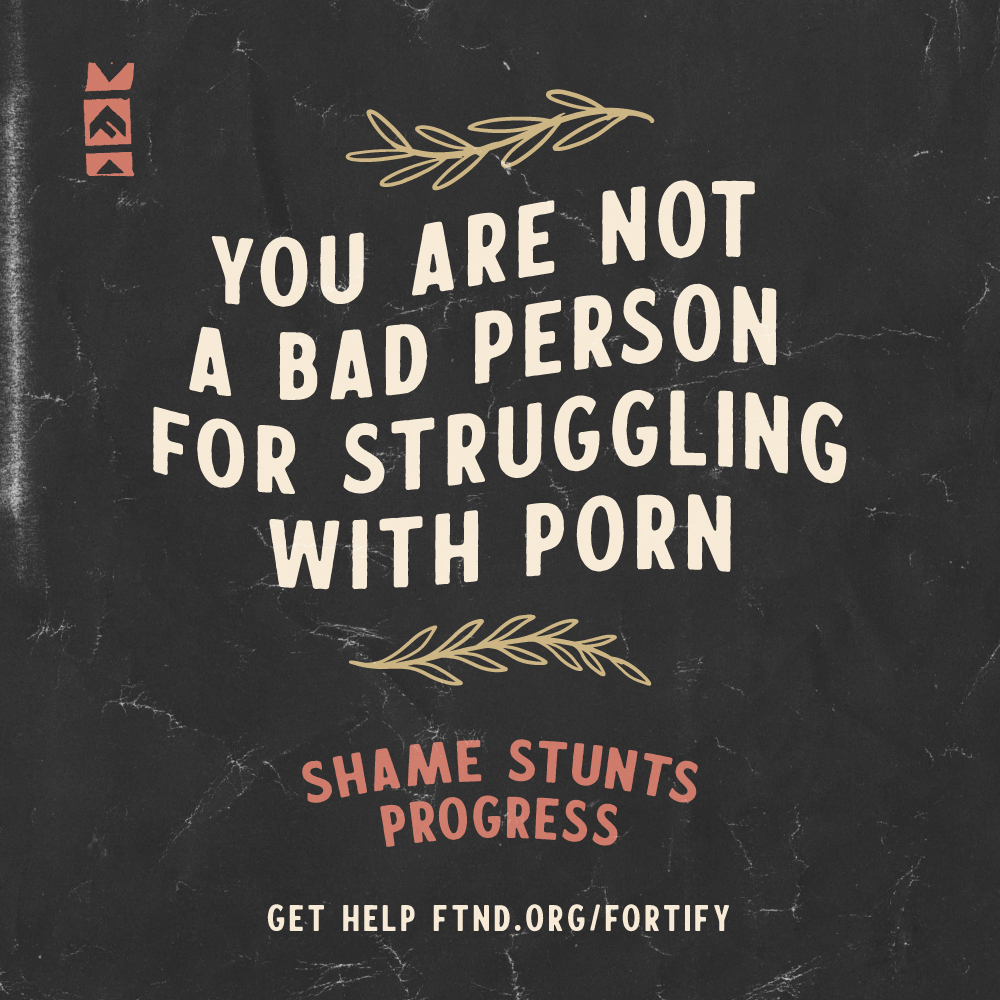Pornography can become addictive for some consumers and it is everywhere. That means that, quite realistically, people that you know, interact with, and even love might be struggling and/or experience the negative effects of porn in their lives.
If you don’t think porn is a healthy habit (and research would back you up, there), you may have to have some hard conversations about this potentially awkward topic. And not only that, but it can be difficult to know what to say when you’re talking to someone about something as personal as recovery from a porn habit—especially when you care about that person and are being hurt by their porn consumption. You want to be able to encourage them into getting better rather than shame them back into their hidden habits.
We want you to feel comfortable helping others and having these conversations, so here are some specific things to avoid saying to someone that is struggling to stop watching pornography. Note that not every person who watches porn is or will become addicted, and not everyone who has an unwanted struggle with porn is addicted. They could struggle from an obsession, compulsion, or fixation, even if they are not addicted.
And if you want to be equipped to have a meaningful conversation with anyone about porn in any context, click below to click through our step-by-step discussion guide.
Avoid: “Why don’t you just stop?”
What you can say instead: “Is there anything I can do to support you as you try to quit?”
Getting over an addictive or compulsive habit like porn usage is not that easy. Porn users can be painfully aware of all the reasons they should stop, but they frequently can’t do it on their own. If they could just stop, they probably would have already done it a long time ago.
Addictive behaviors work on a neurological level. Watching pornography activates the pleasure center of the brain and releases endorphins. Your body can become accustomed to that high and need it more and more frequently, which is similar to how addictive drugs work. That means that quitting porn can be related to quitting drugs or quitting smoking, depending on how deep the habit goes.
Consider it like this: if people could just quit drugs that easily, there wouldn’t be an opioid epidemic sweeping over the nation, right?
According to a 2014 study by German researchers Simone Kühn and Jürgen Gallinat, their findings suggested that heavy porn consumption is linked with less grey matter in the brain. This isn’t great news because the grey matter is what’s used to make decisions. That means the more someone consumes porn, the less capacity they might have to make fully think through decisions—including the decision to quit.
Avoid: “I’m not sure if you’re ever going to get better.”
What you can say instead: “Better days are ahead. It’ll be tough, but you can do this.”
The phrase, “once an addict, always an addict” is not helpful when encouraging someone who is trying to give up a serious porn habit. While it is true that people may struggle with porn for a continued period of time, telling them that they’re never going to get better just destroys their hope.
Related: Is The Word “Addiction” Being Overused?
Not only that, but it’s also completely false. Porn can change and rewire the brain, but the good news is, neuroplasticity works both ways. If porn pathways aren’t reinforced, they’ll eventually disappear, which means recovery is possible. Porn-wired brains can be rewired. The addictive behaviors can be overcome.
It can be hard to be hurt by someone who is struggling with a porn problem, but telling someone that you don’t think they can do it will not help them.
Avoid: “It was easy for me to give it up.”
What you can say instead: “Everyone’s journey is different. It might be challenging to give it up, but I believe you can do it.”
Once again, it’s really not that simple or black and white. For a lot of people who get deeply hooked to porn, they were exposed when they were too young to fully understand what they were seeing, but felt compelled by it anyway. Just because it was easy for you to give up, does not mean that it will be easy for someone else to do so.
Even if you’re trying to let them know that you did it easily in order to show them that it is possible, it could make them feel worse that they’re struggling with it more than you did. And that can just make them feel more isolated and alone, which just feeds pornography problems, doesn’t it?
Avoid: “You’re just going to relapse anyway.”
What you can say instead: “Recovery isn’t linear. You might have some setbacks, but they don’t mean you’ve failed. You can get up and try again.”
Someone with a severe pornography struggle might not even be able to quit cold turkey. Relapses don’t mean that you are starting from square one or that you aren’t making any progress. Relapsing can happen as a part of recovery, but it should be handed as a step forward instead of a setback.
Related: Tips To Quit: Why Setbacks Don’t Mean Failures
There is a difference between helping someone realize that they may have a problem and telling them that they are the problem. Focusing on the relapses doesn’t help anyone progress further. Instead, remind them of the progress that they’ve made already. Tell them that you have hope that they will get over this, and fully recover. Be their encouragement.
Avoid: “You have to recover my way.”
What you can say instead: “What works for someone else might not work for you. Have you found something that works yet?”
Recovery is personal. You may have a difficult time watching someone struggle and believe that forcing him or her to change the way you want will work, but it won’t. It may be true that someone involved in compulsions or addictive behaviors may have impaired decision-making skills, but they still have the right to choose.
Even if you have experience with handling addiction, it’s best to leave recovery plans to the professionals and cheer from the sidelines and make your support and encouragement clear. Although you may honestly be trying to help, your way might not be the best way for them. You might not know the whole situation and might not have the answers. Attempting to force someone to recover will not work. It is a journey and a process they have to go through for themselves.
Avoid: “I get it because I’m totally addicted to ___.”
What you can say instead: “Wow. Addiction/compulsion/obsession sounds like a true struggle. Do you want to tell me what that’s like?”
You may not even really think about it, but casually throwing out the word “addict” or “addiction” around someone who is seriously struggling with compulsive behaviors is not helpful. Joking, “I’m seriously addicted to Parks and Rec, so I totally get it,” just detracts from how hard it can be to recover from compulsive behaviors.
And here’s something to think about: by bringing up your own issues, you are also making it all about you, which isn’t exactly productive when it comes to helping someone get over his or her porn habit. Our advice? Stay aware and try to be as supportive as possible!
Avoid: “Porn is disgusting. Why didn’t you just turn it off in the first place?”
What you can say instead: “So many people are exposed so young. I’m so sorry this evolved into something that’s impacting your life.”
While we are an organization that raises awareness on the harms of porn, we also shed light on the devastating effects of shame and shaming. The secretive and sexual nature of porn already brings with it enough shame. It is never acceptable to shame someone for their porn habit and kicking them when they’re already down.
Related: Why Being Anti-Porn & Anti-Shame Go Hand In Hand
Also, many porn consumers might not have had a choice to turn it off the first time they watched. They may have been forced to. They may have been so young that they didn’t understand. They may not have been fully aware o the negative effects of porn. There are so many reasons a person may have started watching porn, but it is not up to you to decide whether or not those reasons are acceptable to you. Be kind and sensitive.
Shaming destroys and potential for progress by making the porn consumer isolate themself in order to preserve privacy.
Avoid: “You’re just being selfish.”
What you can say instead: “This porn issue is hurtful to me. It seems like porn is hurting both of us right now.”
Someone who struggles with a heavy porn habit but truly wants to stop does not continue consuming because they enjoy it. Often, we see people call those struggling with an obsession “selfish” or “self-focused.” This isn’t only hurtful, it’s also untrue.
The truth is, porn can develop into something that gets out of control and spirals into a compulsion. Not even the consumer wants to deal with what they’re dealing with, so calling them “selfish” completely misunderstands what they’re going through.
Avoid: “I know how you feel.”
What you can say instead: “Whatever you’re feeling, you don’t have to feel it alone.”
Sympathy and empathy are great tools to help relate to someone who is struggling. But it has to be done carefully. Even if you have overcome a similar porn problem, saying that you know exactly what a recovering porn consumer is going through can invalidate their experiences.
Related: You Found Out Your Friend Has A Porn Problem—Now What Do You Do?
You literally cannot know how they feel, but you can reassure them that challenging times pass and that they can do it.
Avoid: “I had no idea this was a problem for you.”
What you can say instead: “Thank you for trusting me enough to tell me about this. That probably wasn’t easy.”
While this statement isn’t exactly outright shaming, pornography consumers are used to hiding their struggle from others, and this can come across as you seeing them differently now that you know about their problem.
Related: 5 Signs That You May Have A Real Problem With Porn
We’re all about shattering the stigma around those who have experienced the negative effects of porn in their lives, so know that anyone, anywhere, at any point in their life can be struggling with porn: whether they’re a man, woman, girl, boy, nonbinary, gay, straight, old, young, or any other diversifying factor, an attraction to and compulsion with porn can be possible.
Be a friend, and try your best to be understanding. A little kindness goes a long way in this fight for love.
Need help?
For those reading this who feel they are struggling with pornography, you are not alone. Check out Fortify, a science-based recovery platform dedicated to helping you find lasting freedom from pornography. Fortify now offers a free experience for both teens and adults. Connect with others, learn about your unwanted porn habit, and track your recovery journey. There is hope—sign up today.
Fight the New Drug may receive financial support from purchases made using affiliate links.





